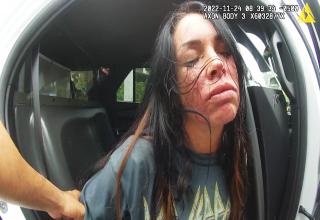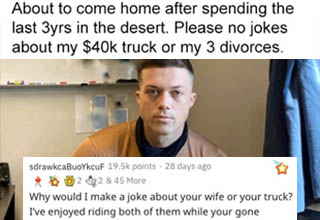Ritual
*Warning, Graphic Content!*
So, The other day someone was awesome enough to post an excerpt from Chuck Palahniuk's book "Haunted" on here. I'm a huge fan of Palahniuk's and I've read all of his books. The excerpt posted the other day was titled "Guts". This excerpt is from the same book, and is called "Ritual". Enjoy...
Ritual
A Story by the Matchmaker
There’s a joke the uncles only tell when they’re drunk.
Half the joke is the noise they make. It’s the sound of someone hawking up spit from the back of his throat. A long, rasping sound. After every family event, when there’s nothing left to do except drink, the uncles will take their chairs out under the trees. Out where we can’t see them in the dark.
While the aunts wash dishes, and the cousins run wild, the uncles are out back in the orchard, tipping bottles back, leaning back on the two rear legs of their chairs. In the dark, you can hear one uncle make the sound:Shooo-rook.Even in the dark, you know he’s pulled one hand sideways through the air in front of him.Shooo-rook,and the rest of the uncles laugh.
The aunts hear the sound and it makes them smile and shake their heads: Men. The aunts don’t know the joke, but they know anything that makes men laugh so hard must be stupid.
The cousins don’t know the joke, but they make the sound.Shooo-rook.They pull a hand through the air, sideways, and fall down laughing. Their whole childhood, all the kids did it. Said:Shooo-rook.Screamed it. The family’s magic formula to make each other laugh.
The uncles would lean down to teach them. Even as little kids, barely on two legs, they’d mimic the sound.Shooo-rook.And the uncles would show how to pull one hand sideways, always from left to right, in front of your neck.
They’d ask—the cousins, hanging off the arm of an uncle, kicking their feet in the air—they’d ask, what did the sound mean? And the hand motion?
It was an old, old story an uncle might tell them. The sound was from when the uncles were all young men in the army. During the war. The cousins would climb the pockets of an uncle’s coat, a foot hooked in one pocket, a hand reaching for the next pocket higher up. The way you’d climb trees.
And they’d beg: Tell us. Tell us the story.
But all an uncle would do is promise: Later. When they were grown up. The uncle would catch you under the arms and throw you over his shoulder. He’d carry a cousin that way, running, racing the other uncles into the house, to kiss the aunts and eat another slice of pie. You’d pop popcorn and listen to the radio.
It was the family password. A secret most of them didn’t understand. A ritual to keep them safe. All the cousins knew was, it made them laugh together. This was something only they knew.
The uncles said the sound was proof that your worst fears might just disappear. No matter how terrible something looked, it might not be around tomorrow. If a cow died, and the other cattle looked sick, swelling with bloat and about to die, if nothing could be done, the uncles made the sound.Shooo-rook.If the peaches were setting in the orchard and a frost was predicted that night, the uncles said it.Shooo-rook.It meant the terror you were helpless to stop, it might just stop itself.
Every time the family got together, it was their greeting:Shooo-rook.It made the aunts cross-eyed, all these cousins making that silly sound.Shooo-rook.All the cousins waving one hand through the air.Shooo-rook.The uncles laughing so hard they stood leaning forward with one hand braced on each knee.Shooo-rook.
An aunt, someone married into the family, she might ask: What did it mean? What was the story behind it? But the uncles would shake their heads. The one uncle, her own husband, would slip his arm around her waist and kiss her cheek and tell her, honey bunch, she didn’t want to know.
The summer I turned eighteen, an uncle said it to me, alone. And that time, he didn’t laugh.
I’d been drafted to serve in the army, and no one could know if I’d ever come back.
There wasn’t a war, but there was cholera in the army. There was always disease and accidents. They were packing a bag for me to take, just me and the uncle, and my uncle said it:Shooo-rook.Just remember, he said, no matter how black the future looks, all your troubles could be disappeared tomorrow.
Packing that bag, I asked him. What did it mean?
It was from the last big war, he said. When the uncles were all in the same regiment. They were captured and forced to work in a camp. There, an officer from the other army would force them to work at gunpoint. Every day, they expected this man to kill them, and there was nothing they could do. Every week, trains would arrive filled with prisoners from occupied countries: soldiers and Gypsies. Most of them went from the train, two hundred steps to die. The uncles hauled away their bodies. The officer they hated, he led the firing squad.
The uncle telling this story, he said every day the uncles stepped forward to drag the dead people way—the holes in their clothes still leaking warm blood—the firing squad would be waiting for the next batch of prisoners to execute. Every time the uncles stepped in front of those guns, they expected the officer to open fire.
Then, one day, the uncle says:Shooo-rook.
It happened, the way Fate happens.
The officer, if he saw a Gypsy woman he liked, he’d take her out of line. After that batch was dead, while the uncles hauled away the bodies, the officer would make this woman undress. Standing there in his uniform, crawling with gold braid in the bright sun, surrounded by guns, the officer made the Gypsy woman kneel in the dirt and open his zipper. He made her open her mouth.
The uncles, they’d seen this happen too many times to remember. The Gypsy would bury her lips in the front of the officer’s pants. Her eyes closed, she’d suck and suck and not see him take a knife from the back of his belt.
The moment the officer came to orgasm he’d grab the Gypsy by her hair, holding her head tight with one hand. His other hand would cut her throat.
It was always the same sound:Shooo-rook.His seed still erupting, he’d push her naked body away before the blood could explode from her neck.
It was a sound that would always mean the end. Fate. A sound they’d never be able to escape. To forget.
Until, one day, the officer took a Gypsy and had her kneel naked in the dirt. With the firing squad watching, the uncles watching with their feet buried in the layer of dead bodies, the officer made the Gypsy open his zipper. The woman closed her eyes and opened her mouth.
This was something the uncles had witnessed so often they could watch without seeing it.
The officer gripped the Gypsy’s long hair, wrapped it in his fist. The knife flashed, and there was the sound. That sound. Now the family’s secret code for laughter. Their greeting to each other. The Gypsy fell back, blood exploding from under her chin. She coughed once, and something landed in the dirt next to where she died.
They all looked, the firing squad and the uncles and the officer, and there in the dirt was half a cock.Shooo-rook,and the officer had cut off his own erection stuck down the throat of this dead woman. The zipper in the officer’s pants was still erupting with his seed, exploding with blood. The officer reached one hand to where his cock lay coated with dirt. His knees buckled.
Then the uncles were dragging away his body to bury it. The next officer in charge of the camp, he wasn’t so bad. Then the war was over, and the uncles came home. Without what happened, their family might not be. If that officer had lived, I might not exist.
That sound, their secret family code, the uncle told me. The sound means: Yes, terrible things happen, but sometimes those terrible things—they save you.
Outside the window, in the peach trees back of their house, the other cousins run. The aunts sit on the front porch, shelling peas. The uncles stand, their arms folded, arguing about the best way to paint a fence.
You might go to war, the uncle says. Or you might get cholera and die. Or, he says, and moves one hand sideways, left to right, in the air below his belt buckle:Shooo-rook . . .





6 Comments